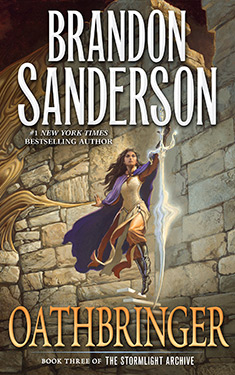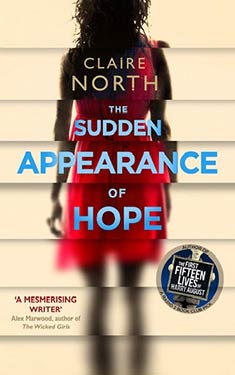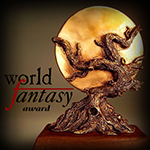Marvel Studios’ Avengers: Infinity War Official Trailer
Don’t know about you but I am getting a little tired of super hero movies… but this is the big one we’ve been waiting a long time to see and it looks pretty damn good.
Guest Post: Oathbringer Review
This guest post by Craig Hanks originally appeared at TheLegendariumPodcast.com and is reprinted here with permission. The Legendarium Podcast is a must for any Sanderson fan — these guys are the experts — and they cover many other epic fantasy staples including Lord of the Rings, Wheel of Time, and Shannara. You can subscribe to The Legendarium on iTunes.
A note on spoilers. In this review, I’m not going to spoil any major reveals. But a few general plot points are fair game here. So if you’re hoping to go into your reading of Oathbringer 100% fresh (not a bad call, since impeccable story structure and Roshar-shattering reveals are Sanderson hallmarks), turn back now. If you’re just looking for a little pre-game commentary, though, then read on.
“Your words are not that special, Brandon Sanderson.”
So said my wife after I congratulated myself on finishing one-third — 400 pages — of Oathbringer, the third of Sanderson’s mammoth Stormlight Archive series. Even for someone of my fantasy-oriented literary proclivities, this book is a monster. Ten-point type scrunched between barely-there margins, filling 1,250 pages? To the uninitiated, this appears as an act of extreme hubris. I assure you it is not.
It’s not hubris but deserved confidence that has driven Sanderson to write over a million words across three volumes of The Stormlight Archive so far. It’s the confidence of someone who is in full command of his prose and, more importantly, his worldbuilding. His words are great, but it’s his worlds that command attention. More on that in a bit; let’s talk Oathbringer specifically for a moment.
Listen to the spoiler-free review episode here:
The story still focuses on our three main characters: Kaladin, Shallan, and Dalinar. Where The Way of Kings revealed Kaladin’s back story and Words of Radiance did the same for Shallan, Oathbringer belongs to Dalinar. The title in this case refers not only to a book-within-the-book, as previously, but also to Dalinar’s mystical sword, or shardblade. Flashbacks show us Dalinar in his prime, wielding Oathbringer to devastating effect across the kingdom he is working to unite by force.
But the most impactful portions of the flashbacks are reserved for Dalinar’s relationship with his wife, memories of whom were apparently so painful that Dalinar had them magically excised from his mind. Learning what drove Dalinar to such drastic action makes for some of the most gut-wrenching scenes in Sanderson’s entire œuvre.
While the book focuses its flashbacks on Dalinar, fans of our other heroes need not worry; we spend plenty of time with both Kaladin and Shallan. Kaladin spends a good portion of Oathbringer learning that fulfilling his Windrunner oaths (“I will protect those who cannot protect themselves” / “I will protect even those I hate, so long as it is right”) requires actions that are not always easily justified.
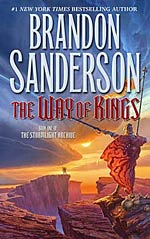 Meanwhile, Shallan is faced with the same dilemma as Vin, the heroine of the Mistborn trilogy: she must decide which of her personae is the true one. The more literal nature of Shallan’s journey toward self-understanding is a result of the magic systems peculiar to Roshar and Shallan in particular.
Meanwhile, Shallan is faced with the same dilemma as Vin, the heroine of the Mistborn trilogy: she must decide which of her personae is the true one. The more literal nature of Shallan’s journey toward self-understanding is a result of the magic systems peculiar to Roshar and Shallan in particular.
Oh, and praise the Stormfather, the love triangle between Shallan, Kaladin, and Dalinar’s son Adolin that started in book two is resolved here in a way that is at once unexpected, sensible, and satisfying. Which is for the best, since the series at large could easily have been bogged down by a bunch of unnecessary — and surely angsty — YA-style emotional handwringing.
Time must be taken here — because damned if plenty of time wasn’t taken in the first half of the book — to mention secondary and tertiary characters, of which there are legion. Fan favorites are either completely absent (Eshonai) or cruelly underused (Rock, Lopen), while others are unexpectedly given substantial page counts (Teft, Moash). Depending on your appetites, this will either be a boon or a curse. I’m still undecided.
Ultimately though, Oathbringer, while clocking in at an eye-popping 391,840 words, manages to be the tightest of the three Stormlight books in terms of character scope, especially in the last half. As with The Way of Kings, there comes a tipping point somewhere around halfway through the book where the setups beget payoffs, which come faster and faster until the final pages. If you’d asked me at page 500 whether Oathbringer is a page-turner, I’d have said no. By page 800, though, it was a firm yes.
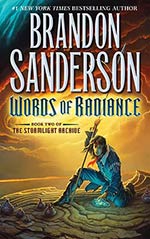 It’s not all roses, of course. As I’ve alluded to a few times already, this book is just plain long. While many high fantasy aficionados are ready and willing to dive into 1,000+ pages, such hefty word counts make The Stormlight Archives difficult to recommend to newcomers. If it’s true — as many Sanderson fans say — that this is his best series to date, then it’s a shame that it’s so difficult to recommend to anyone who isn’t yet on the Brandon train. Entry-level material this is not.
It’s not all roses, of course. As I’ve alluded to a few times already, this book is just plain long. While many high fantasy aficionados are ready and willing to dive into 1,000+ pages, such hefty word counts make The Stormlight Archives difficult to recommend to newcomers. If it’s true — as many Sanderson fans say — that this is his best series to date, then it’s a shame that it’s so difficult to recommend to anyone who isn’t yet on the Brandon train. Entry-level material this is not.
Another barrier to entry is Oathbringer’s dependency on Sanderson’s other work. To fully appreciate the characters and events of this book, it’s necessary not only to have read, but to remember fairly well several of his other “cosmere” books, especially Warbreaker, the Mistborn series, and Elantris.
Thankfully, these crossover moments are written in such a way that you won’t be slowed too much in your reading if you’re not familiar with these other books. But if you’re not up to speed with those stories, then you’ll likely be scratching your head at the end of Oathbringer, trying to figure out why certain characters and objects were so prominent. To a newcomer to Sanderson’s cosmere, this stuff will feel like so much bloat in an already massive book.
Back to those possibly-not-that-special words. There’s a tendency among Sanderson’s detractors, and even those who simply prefer other authors, to point to his prose style as lacking in some respect. The most common complaint I hear is something along the lines of, “It’s just so … utilitarian.”
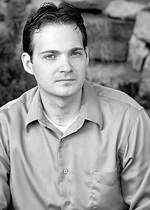 But this is precisely what I, and millions of others, enjoy. And Sanderson’s prosaic prowess is on full display in Oathbringer. “In the best prose,” as Arthur Clutton-Brock put it in his essay The Cardinal Virtue of Prose, “we are so led on as we read, that we do not stop to applaud the writer, nor do we stop to question him.” Indeed, rarely does Sanderson puncture the fourth wall of the narrative with a poetic flourish, drawing attention to himself rather than the story at hand. His discipline helps to make this a story in which you can — and should, and will — become blissfully lost.
But this is precisely what I, and millions of others, enjoy. And Sanderson’s prosaic prowess is on full display in Oathbringer. “In the best prose,” as Arthur Clutton-Brock put it in his essay The Cardinal Virtue of Prose, “we are so led on as we read, that we do not stop to applaud the writer, nor do we stop to question him.” Indeed, rarely does Sanderson puncture the fourth wall of the narrative with a poetic flourish, drawing attention to himself rather than the story at hand. His discipline helps to make this a story in which you can — and should, and will — become blissfully lost.
But why bother to get lost at all if the place you’re losing yourself isn’t worthwhile? Here we come to Sanderson’s true genius: creating compelling, instructive worlds and peopling them with compelling, instructive characters. And when it comes to his worlds, the rule is simple: worse is better. Sanderson’s M.O. seems to be to create the most vivid, dark, smelly, miserable, unstable locations he can think of, then set loose a cast of characters and see how they react. The now-classic example is that of Vin and Elend, Mistborn’s protagonists, wading hip-deep through never-ending volcanic ash toward the literal end of the world. “Bleak” doesn’t begin to cover it.
The world of The Stormlight Archive, like that of Mistborn, seems like a miserable place to be. A good portion of Sanderson’s magic comes in making you want to be there anyway, for as long as you can. Such is the case with Oathbringer. If my chief complaint with the book is its length, then next in line is that I can’t spend another thousand pages on Roshar.
“Your words are not that special, Brandon Sanderson.” That’s up for debate, I suppose, though I know where I’d come down. What’s not up for debate is that Sanderson’s worlds are indeed that special.
DEADPOOL 2 Official Teaser Trailer #2
This is equal parts weird and hilarious. Looking forward to this one.
Should Science Fiction Be Rational?
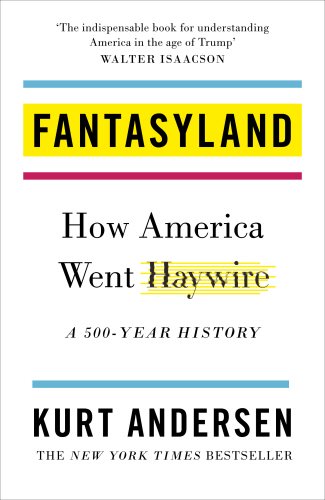 In the book Fantasyland: How America Went Haywire: A 500-Year History by Kurt Andersen catalogs countless ways in which America is irrational. Andersen is an admirer of Philip K. Dick, and quotes/mentions him more than once, including one very long passage where Andersen says he couldn’t explain things better than PKD. However, Andersen connects science fiction several times to irrational thinking, and sometimes I get the feeling he thinks science fiction is a catch-phrase for nutty ideas.
In the book Fantasyland: How America Went Haywire: A 500-Year History by Kurt Andersen catalogs countless ways in which America is irrational. Andersen is an admirer of Philip K. Dick, and quotes/mentions him more than once, including one very long passage where Andersen says he couldn’t explain things better than PKD. However, Andersen connects science fiction several times to irrational thinking, and sometimes I get the feeling he thinks science fiction is a catch-phrase for nutty ideas.
Here’s one quote, “Like so much pseudoscience, mesmerism was faulty science fiction, a fantasy inspired by a misunderstood bit of reality” – is Andersen defining science fiction as fantasy literature that misunderstands reality?
The last science fiction novel I read was Chocky by John Wyndham. Its premise is telepathy exists and works instantaneously across the vast distances of space. Wyndham in his story proposes that matter is limited to the speed of light but not mind, and thought has no speed limit. Chocky is a far distant alien that possesses a 12-year-old British boy. Of course, this idea is descended from Star Maker by Olaf Stapledon. I consider alien mind travel a fun meme for fantasy stories, but the philosophical disciples of Shirley MacLaine would testify under oath that’s how reality actually works.
Here’s another quote, where he talks about L. Ron Hubbard:
“Hubbard had a brazen indifference to the line between nonfiction and fiction—specifically science fiction, and not just e-meters. Scientology’s theological backstory is staggeringly ridiculous sci-fi, 2001 meets Star Trek meets Star Wars meets The Matrix meets Prometheus. In short, each of us contains a thetan, one of the ethereal beings who created the universe but each of whom, after being shipped to Earth and hit with nuclear bombs by the evil dictator of the Galactic Confederacy, was brainwashed to forget its godlike origins and believe in the false reality most people consider real.”
You have to admit that Scientology is whacked, but then so are the ideas in those TV shows and movies. We think of them as fun. Andersen claims 2/3rds of our society think of them as gospel.
Fantasyland is a book everyone should read because it defines our times better than any book I’ve read in the 21st-century. However, as science fiction fans we need to ask ourselves some very serious questions. Andersen makes an overwhelming case that America has become irrational with about two-thirds of its citizens rejecting science and rational thought. How much has science fiction contributed to the emerging paradigm of believing anything is possible because believing is what powers our reality?
If you don’t think this is true, then I plead for you to read Fantasyland. It is the Future Shock of this generation. To show I’m not holier than thou, I wrote “22 Dumb Fantasies I’ve Tried to Believe” at my blog. I’ve since realized I could have easily doubled or tripled that number.
Science fiction is as tainted as New Age philosophies when it comes to pseudo-science. Cleaning up the genre will be just as hard as convincing society at large to think scientifically. I doubt it’s even possible. But shouldn’t we try? Should science fiction take a position in the current war of the irrational on the rational? If you think that last sentence is hyperbole, then read Fantasyland.
2017 World Fantasy Awards Winner!
The 2017 World Fantasy Awards winners have been announced. The awards were presented during the World Fantasy Convention, held November 2-5, 2017 at the Wyndham Riverwalk in San Antonio, TX. In the Best Novel category the winner is:
WINNER:
- The Sudden Appearance of Hope by Claire North (Redhook; Orbit UK)
FINALISTS:
- Borderline by Mishell Baker (Saga)
- Roadsouls by Betsy James (Aqueduct)
- The Obelisk Gate by N.K. Jemisin (Orbit US; Orbit UK)
- Lovecraft Country by Matt Ruff (Harper)
Our congrats to Claire North and all the finalists. You can see the complete list of winners in all categories over at Locus.



















 Full Details
Full Details
